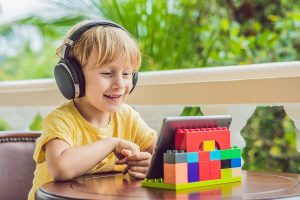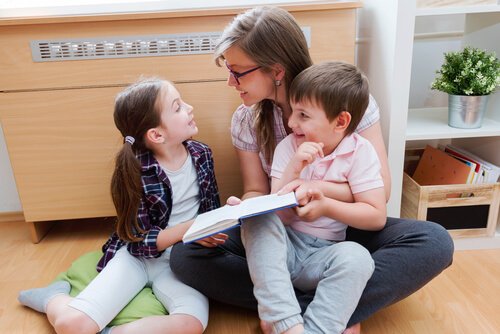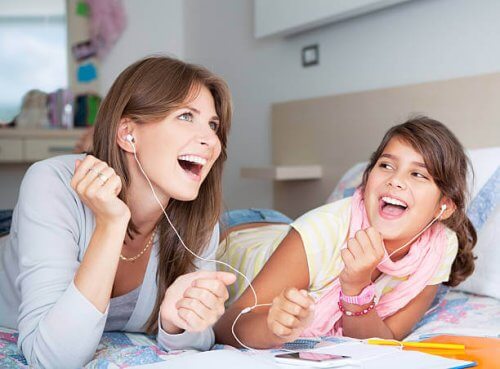Using Music to Introduce Children to Literature

It’s important to create good reading habits from an early age. But what is the best way to introduce children to literature? In this article we’ll explain how we can use music to help foster an appreciation for literature in young readers.
Literature is considered to play an important role in children’s education and development. This is because of its ability to improve creative abilities and form one’s personality.
Children who read regularly tend to have a greater imagination and are more able to socialize with others. What’s more, they’re are also better at expressing their emotions.
If we use music to introduce children to literature, this becomes a very exciting activity for them. As a result, children will come to have an appreciation for literature, without parents and teachers having to force it on them.
Music helps children develop a curiosity for reading. That’s why there is such a wide variety of audio books on the market.
The purpose is for children not just to read, but also listen to music and sound. The combination takes them on a journey of imagination to wherever the book takes them.
You could say that it’s the perfect way to motivate little ones to develop a love for literature. In fact, this can happen even before they know how to read.
The importance of children’s literature
Children’s literature is very important when kids are young. Exposing children to reading from the time they’re small boosts vocabulary, writing, comprehension and diction. All of this improves their ability to express themselves.
At the same time, these children are more sure of themselves and more communicative.
In the same way, their progress at school is much more satisfactory, since they’re much less likely to have learning difficulties. In turn, this boosts their sense of security and confidence in what they can achieve.
Children who adopt reading habits are more capable of acquiring higher knowledge and a broader level of comprehension. This facilitates their interaction with other children and also with adults at any stage of their lives.

Music makes it fun
In general, children have a hard time sitting still to read. This is an activity that many kids find boring, especially today with so much access to technology. Television, tablets, video games, cell phones and the like make children much more prone to distraction.
“Music helps children develop a curiosity for reading.”
How does music help introduce children to literature?
Music helps children open up their senses to literature, allowing them to take full advantage of the benefits. Furthermore, they can become passionate about the stories that they can discover through reading.
It’s very important to introduce children to literature from the time they’re very small. It’s for that very reason that children’s literature exists.
Children’s literature is aimed exclusively at children and is created precisely for those who want to listen and learn. In this genre, children discover wonderful stories filled with magic and adventure.

Benefits for children
Children that have exposure to literature from a young age are better prepared to study books in the future when it comes to academics. They’ll become adults with a strong emotional, personal and intellectual foundation.
One of the main issues that you should keep in mind when you introduce children to literature is that each child is unique. Allow kids to choose what they read, rather than forcing literature on them.
Children should have the freedom to choose what they like. That way, they’ll see reading as something pleasant, rather than a boring or tedious obligation.
Little by little, they’ll broaden their tastes and enjoy more literary styles, and reading will be part of their daily routine.
It’s important to create good reading habits from an early age. But what is the best way to introduce children to literature? In this article we’ll explain how we can use music to help foster an appreciation for literature in young readers.
Literature is considered to play an important role in children’s education and development. This is because of its ability to improve creative abilities and form one’s personality.
Children who read regularly tend to have a greater imagination and are more able to socialize with others. What’s more, they’re are also better at expressing their emotions.
If we use music to introduce children to literature, this becomes a very exciting activity for them. As a result, children will come to have an appreciation for literature, without parents and teachers having to force it on them.
Music helps children develop a curiosity for reading. That’s why there is such a wide variety of audio books on the market.
The purpose is for children not just to read, but also listen to music and sound. The combination takes them on a journey of imagination to wherever the book takes them.
You could say that it’s the perfect way to motivate little ones to develop a love for literature. In fact, this can happen even before they know how to read.
The importance of children’s literature
Children’s literature is very important when kids are young. Exposing children to reading from the time they’re small boosts vocabulary, writing, comprehension and diction. All of this improves their ability to express themselves.
At the same time, these children are more sure of themselves and more communicative.
In the same way, their progress at school is much more satisfactory, since they’re much less likely to have learning difficulties. In turn, this boosts their sense of security and confidence in what they can achieve.
Children who adopt reading habits are more capable of acquiring higher knowledge and a broader level of comprehension. This facilitates their interaction with other children and also with adults at any stage of their lives.

Music makes it fun
In general, children have a hard time sitting still to read. This is an activity that many kids find boring, especially today with so much access to technology. Television, tablets, video games, cell phones and the like make children much more prone to distraction.
“Music helps children develop a curiosity for reading.”
How does music help introduce children to literature?
Music helps children open up their senses to literature, allowing them to take full advantage of the benefits. Furthermore, they can become passionate about the stories that they can discover through reading.
It’s very important to introduce children to literature from the time they’re very small. It’s for that very reason that children’s literature exists.
Children’s literature is aimed exclusively at children and is created precisely for those who want to listen and learn. In this genre, children discover wonderful stories filled with magic and adventure.

Benefits for children
Children that have exposure to literature from a young age are better prepared to study books in the future when it comes to academics. They’ll become adults with a strong emotional, personal and intellectual foundation.
One of the main issues that you should keep in mind when you introduce children to literature is that each child is unique. Allow kids to choose what they read, rather than forcing literature on them.
Children should have the freedom to choose what they like. That way, they’ll see reading as something pleasant, rather than a boring or tedious obligation.
Little by little, they’ll broaden their tastes and enjoy more literary styles, and reading will be part of their daily routine.
All cited sources were thoroughly reviewed by our team to ensure their quality, reliability, currency, and validity. The bibliography of this article was considered reliable and of academic or scientific accuracy.
- Comín, J. J. P. (2005). Música y Literatura: hacia un proyecto didáctico interdisciplinar. Música y educación: Revista trimestral de pedagogía musical, 18(63), 41-72.
- Ojeda, E. L. (2013). Literatura y música. Brocar. Cuadernos de Investigación Histórica, (37), 121-144. https://publicaciones.unirioja.es/ojs/index.php/brocar/article/view/2541
- Ortiz-de-Urbina, P. I. (1999). Música y literatura: Una propuesta didáctica. Encuentro. Revista de Investigación e Innovación en la clase de idiomas, 11, 1999-2000. https://core.ac.uk/download/pdf/58902222.pdf
This text is provided for informational purposes only and does not replace consultation with a professional. If in doubt, consult your specialist.








